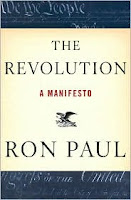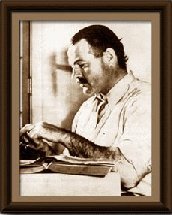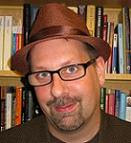
Then a wonderful thing happened. Oh, Ron Paul has been alternately marginalized, ignored, and ridiculed by the usual suspects in government and the media. But thanks to the magic of the Internet, his message has nevertheless spread far and wide among a new generation of what Albert Jay Nock called the Remnant. He's set fundraising records and ignited a bona fide political movement for liberty. I guess I'm not the only one nauseated by the grim prospect of fascist warmonger John McCain facing off against socialist warmonger Hillary Clinton for the prize of becoming Emperor of the Dolts.
And here we have Ron Paul's campaign book. Campaign books by their nature have a very short shelf life and perform no useful task (for the reader); they're written only to make the candidate sound like a normal, warm human being with ordinary goals and values instead of a creepy, reptilian politician who gets sexually aroused only by the prospect of power and money.
Needless to say, The Revolution: A Manifesto is different. Anyone who has met Ron Paul -- or even just watched him on TV -- has already figured out that he is a normal, warm human being. He has nothing to prove in that arena. Instead, he has laid out, in simple and easy-to-understand terms, the case for freedom. Not freedom in that corrupted sense that pretends this or that government program will "help" us be happy -– but real, honest-to-God, traditional American freedom from government, just as our Founders intended.
Away with the tax collectors. Away with the bureaucrats. Away with the regulators. Away with the babysitters and busybodies. Away with every manner of petty tax-eating loser who would presume to tell us what to do with our lives and how to do it. Ron Paul represents what I hope is not the last of a long line of Americans who know what real freedom is and embrace it. In fact, this book should help ensure others will take up the cause -- before we are all really, really sorry.
In just 167 pages, Dr. Paul lucidly expounds matters of foreign policy, economics, civil liberties, monetary policy, the Constitution, and more. He provides plenty of quotations and other support to ground what he is saying firmly in authentic American tradition. He shows how appealing and even simple the message of freedom is, even in an age like ours, when it has again become "radical" to insist on strict boundaries for government, an entity that should properly be thought of as nightsticks and jackboots, not Christmas presents and candy.
Without divine intervention, Ron Paul won't rise to the office of American emperor (in order to begin dismantling it), but those of us who have been around a while recognize the real value of his candidacy. Thanks to the Good Doctor, millions more Americans now see the Federal Reserve for what it really is: a massive engine of fraud that picks their pockets for the benefit of the wealthy and politically connected. It has, for the first time in my life, become permissible to not only question what the central bank is doing, but ask why it even exists. That is real progress.
Ron Paul's candidacy has also exposed, once and for all, the narrow agenda of the mass media, which has been in bed with the state for many, many decades, and the insincerity of the "house libertarians" of the D.C. think tank circuit (cough, Cato, cough), who, instead of getting behind Dr. Paul, helped engineer a smear campaign against him. No one serious about libertarian action will ever trust them again.
Finally, Ron Paul has said what has needed saying for a long time: that America has become an empire, and empire is a particularly bad hobby that we can ill afford, financially or otherwise. It's time for "conservatives" to re-discover their anti-imperial roots and abandon the dubious project of bombing the world into "democratic" submission. Remember when liberal Woodrow Wilson was rightly ridiculed for this attitude? And remember he was a utopian liberal Democrat? Republican warmongers can get a little squirmy when anyone brings this up.
For confirmed advocates of liberty, The Revolution will not offer much they don't already know. What the book does offer is a great introduction for the average American who has become accustomed to thinking that getting permission from the government is the same thing as freedom. The Revolution has the potential to re-orient Joe Sixpack's point of view back toward American ideals and away from the statist brainwashing he received in government school. To that end, you should read this book then get as many of your friends, neighbors, and family members as possible to read it, too. It really can make a difference.
Let the revolution... continue!
Tuesday, April 29, 2008
A Review of The Revolution: A Manifesto
Posted by Dave at 12:36 AM
Subscribe to:
Comment Feed (RSS)











|